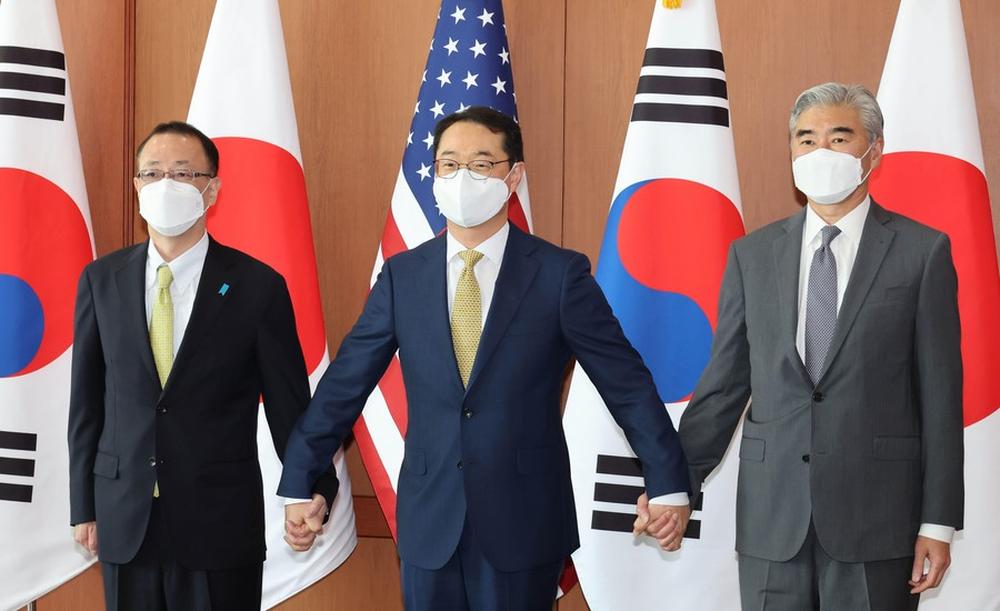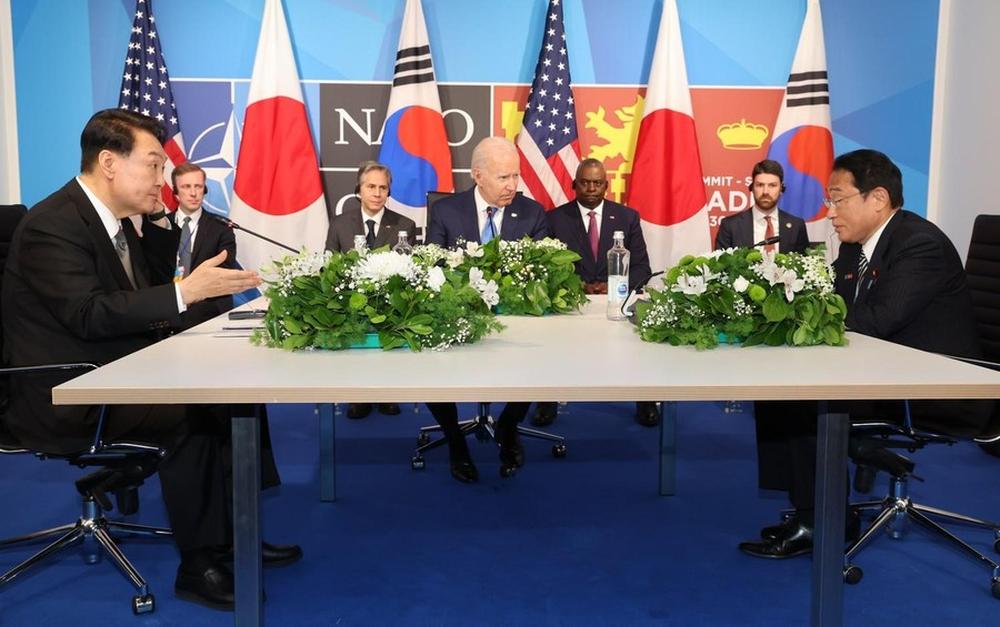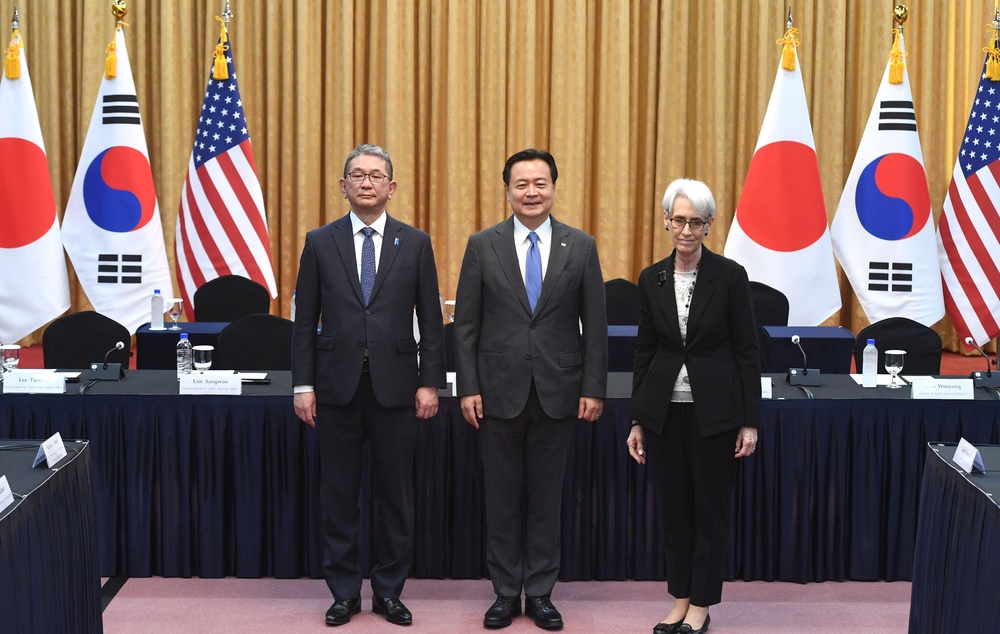- #China-US Competition
- #Global Issues
- #Multilateral Relations
- #US Foreign Policy

► As US-China strategic competition further escalates, the leader of each strategic camp will be incentivized to ask its partners to show full support for its cause and treat them according to their contributions.
► As such, South Korea and Japan will receive greater pressure from the United States to mend their bilateral relations
► Resolving the historical conflicts between the two countries will take a long time. In the meantime, the best way to proceed will be to take small but persistent steps to shape the conditions for enhanced security cooperation between Seoul, Washington, and Tokyo.
“There are decades where nothing happens, and there are weeks where decades happen.” Although Vladimir Lenin famously said this to describe the Russian Revolution, the quote captures the global security dynamics of the past few months remarkably well. Russia invaded Ukraine in February 2022, marking the largest conventional war in Europe since World War II. North Korea launched 31 ballistic missiles this year, yet the United Nations Security Council failed to adopt a resolution in May due to China and Russia’s veto. Following US House Speaker Nancy Pelosi’s visit to Taipei, as of today, August 9, China has been conducting live-fire military drills near Taiwan and encircling the island. All of these developments are reminiscent of the volatile days and critical events leading up to the most horrific war in human history, including the Rhineland Crisis, the Sudeten Crisis, and the attack on Pearl Harbor. The world is now divided once again, and close security cooperation among like-minded countries is emerging, either voluntarily or with some level of coercion. ROK-US-Japan trilateral cooperation is no exception.
Let me explain this by unpacking the United States’ and China’s grand strategies. The Biden administration has been trying to establish the “Indo-Pacific Operating System,” seeking (1) continuous expansion of partnership and (2) deep integration among like-minded countries in the region, as exemplified by Five Eyes, Quad, and AUKUS. The Russia-Ukraine war provided Washington with an excellent opportunity to expedite the process of building this global alliance network. In his keynote address at CSIS on May 9, Indo-Pacific Policy Coordinator Kurt Campbell emphasized that the unprecedented support of US-allied Asian countries for NATO after the war in Ukraine erupted demonstrated that Washington’s efforts to link the Indo-Pacific and European theaters are “bearing fruit.” The United States’ invitation of South Korea, Japan, Australia, and New Zealand to the Madrid NATO summit and the adoption of the new NATO Strategic Concept defining China as a “systematic challenge” are the culmination of Washington’s endeavors throughout this year to establish an extensive alliance network. The Biden administration will continue to build and strengthen a global security system capable of flexible and powerful reaction to contingencies in Europe and the Indo-Pacific regions.
Beijing’s response to Washington’s “Indo-Pacific Operating System” is the “Global Security Initiative (GSI).” At the opening ceremony of the Boao Forum for Asia Annual Conference 2022, President Xi Jinping pointed out that humanity is facing the unprecedented, complex, combined challenge of the pandemic, renewed traditional security risks, slow global economic recovery, and a governance deficit in climate change and the digital sphere. Founded on the assumption that the world is an “indivisible security community,” the GSI rejects “hegemonism and power politics.” Accordingly, the key principle of the initiative is to uphold “common, comprehensive, cooperative and sustainable security” and to respect “the sovereignty and territorial integrity of all countries.” The Chinese government and affiliated research institutes are advertising GSI as “Chinese Wisdom, a Chinese Path, and a Chinese Solution” for new challenges in international security.
However, the principles of the GSI seem to contradict each other, revealing the initiative’s limitations. If the principle of “indivisibility of security” is the backbone of the logic underlying GSI, Beijing should have suggested a viable path to harmonizing the security concerns of one state with that of others. Yet, whenever the issues of human rights in Hong Kong or security concerns related to the South China Sea or Taiwan are raised by the international community, Chinese official statements highlight that these are “purely China’s domestic affairs,” that China has “sovereignty” over the area, or that such concerns are nothing but an “interference in our internal affairs and violation of our sovereignty.” If Beijing continues to protect its national interest in the name of “cooperative security” and refuses to address other states’ security concerns for the sake of its “sovereignty and territorial integrity,” the GSI will likely not receive much support from neighboring countries in the region. The United States will try to seize the moment and maximize its efforts to consolidate the emerging global alliance network by extending its military support to those countries resisting Beijing’s coercion. China, of course, will react strongly against this move.
Accordingly, we expect to witness growing tension and conflict between Washington and Beijing in the coming years. The two most significant powers in the international system clash over the issues of Ukraine, North Korea, and Taiwan. Washington and Beijing are pointing fingers at each other, claiming that the other side is a “bully” in the region. The tension is expected to intensify even further in the short term. Consequently, the strategic leeway between the US and China that other middle powers can have is quickly evaporating. As US-China strategic competition further escalates, the leader of each strategic camp will be incentivized to ask its partners to show full support for its cause and treat them according to their contributions. For example, high-ranking American officials use different terms to refer to US allies in the region, such as “crown jewels,” ”cornerstone,” and “linchpin,” and have even specified: “these are carefully chosen words and they are meaningful, and they are in fact reflective of how we view these very important relationships.”
As such, South Korea and Japan will receive greater pressure from the United States to mend their bilateral relations. Ties between Seoul and Tokyo, which have been strained since the 2018 ROK Supreme Court ruling against a Japanese firm on forced labor and Japanese removal of South Korea from its trade “whitelist,” are the missing link in the security network Washington aims to create. That is why Washington included expanding ROK-US-Japan cooperation as one of the ten action plans in its 2022 Indo-Pacific Strategy, and held numerous three-way meetings between American, Korean, and Japanese high-ranking officials in May and June 2022, including the June 29 trilateral summit, which took place on the sidelines of the NATO Summit.
Therefore, the Yoon and Kishida administrations cannot but seek to improve the two countries’ relations. Many experts and government officials suggest a similar solution to this age-old problem: the “two-track approach,” or the separation of historical issues from security cooperation. From addressing the increasing security threat of North Korean nuclear and missile programs and Chinese coercive behaviors in the Taiwan Strait and the South China Sea to establishing economic connectivity, sustainable supply chains, and democratic resilience in the region, Seoul and Tokyo’s interests inexorably converge. They are “natural partners” whose security is “indissolubly intertwined.” Both Seoul and Tokyo understand the region’s changing strategic environment. During the Shangri-La Dialogue, Japanese Defense Minister Nobuo Kishi and South Korean Minister of National Defense Lee Jong-sup met with US Secretary of Defense Lloyd J. Austin III and agreed to deepen trilateral cooperation on “information sharing, high-level policy consultations, and combined exercises” to promote “the international rules-based order” and oppose “any unilateral actions that seek to alter the status quo and increase tensions.”
The biggest obstacle to materializing this agreement is the growing unpopularity of the Yoon Suk Yeol government. Most recently, President Yoon’s approval rating plummeted to 24%, a number similar to previous end-of-term approval ratings for outgoing presidents in South Korea. I doubt that President Yoon holds enough political capital to successfully pursue the normalization of Korean-Japanese relations. Considering the recent victory of Prime Minister Fumio Kishida and given that the Liberal Democratic Party enjoys a substantial majority in both houses of the National Diet after this year’s House of Councillors election, Japan would be able to take the first step toward repairing bilateral ties. Prime Minister Kishida could consider measures such as placing South Korea back on Japan’s whitelist, or temporarily allowing South Koreans to enter Japan without a visa. Resolving the historical conflicts between the two countries will take a long time. In the meantime, the best way to proceed will be to take small but persistent steps to shape the conditions for enhanced security cooperation between Seoul, Washington, and Tokyo.
Yang-Gyu Kim is a Principal Researcher at East Asia Institute and a Lecturer in the Department of Political Science and International Relations at Seoul National University. He holds a Ph.D. in International Relations from Florida International University (2019) and received his Master’s (2014) and Bachelor’s degrees (2008) in International Relations from Seoul National University. Kim was a Visiting Scholar at the Arnold A. Saltzman Institute of War and Peace Studies at Columbia University (2020-2021). He also taught IR theory, security, and foreign policy courses at Florida International University as an Adjunct Professor (2020-2021). Kim joined the Ph.D. program with a Fulbright Graduate Study Award and received the Smith Richardson Foundation’s “World Politics and Statecraft Fellowship” award for his dissertation work. Kim’s research focuses on international security, including coercive diplomacy, nuclear weapons strategy, power transition, U.S.-China relations, and North Korea. His recent works include “At the Brink of Nuclear War: Feasibility of Retaliation and the U.S. Policy Decisions During the 1962 Cuban Missile Crisis” and “The Feasibility of Punishment and the Credibility of Threats: Case Studies on the First Moroccan and the Rhineland Crises.”

